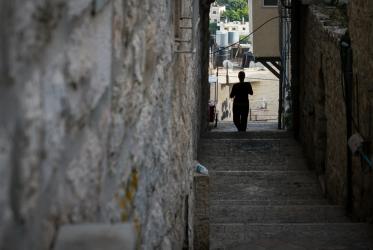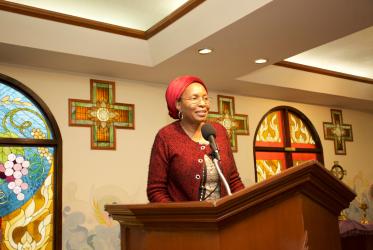What are the prospects for theology in peacebuilding? A couple of years ago this question became the springboard for my research on a textual process that was carried out by the World Council of Churches. The process towards an international ecumenical declaration on just peace resulted in An Ecumenical Call to Just Peace and the study document Just Peace Companion being published in 2011. Eventually, it formed part of the groundwork of the current Pilgrimage of Justice and Peace. My research on this process drew my attention to a couple of themes that inspire theological conversation around the very idea of a pilgrimage: the way, the movement, the process, and the fellow traveller.
Just peace is frequently illustrated as a way. Just peace is not simply a distant goal. Instead, peace is the way to peace: in order to harvest peace one needs to sow peace. Theology can form such seeds for peace. It can nurture the growth of peace. However, theology can also steer the development in completely different directions. In the worst case, it can serve the legitimisation of violence and war. In other words, if the way is to be paved in a peaceful direction, the continuous and insistent work of nurturing the growth of peace oriented theology is crucial.
Ecumenical theology can contribute essentially to this work. By placing the idea of a unity in diversity at the centre of the theological conversation, ecumenical theology wrestles with delicate issues of both conflict and concord. It involves the continuous consideration of ways to coexist, interact, and shape common visions - not in spite of, but in appreciation of, differences.
In this way, ecumenical theology gives rise to models and concepts that are of interest in a wider peacebuilding context. Theological models and concepts, which guide believers to peaceful coexistence, may provide impetus to the interdisciplinary debate on religious peacebuilding.
Countering theological legitimisations of violence with theological arguments is an urgent contemporary task. Here, ecumenical theology provides a spectrum of thought, which draws on more than a century of ecumenical engagement for finding peaceful ways out of international conflicts. In being developed in the framework of the ecumenical movement, ecumenical theology embraces an extensive reservoir of thoughts on theologically grounded ways of living peacefully together.
Even though the relevance of ecumenical theology in peacebuilding may seem evident, theological voices do not always have a self-evident place in ecumenical discussions on peace. One reason is the tendency of theology to sometimes develop detached from immediate contexts of struggle against violence and war. The process towards an international ecumenical peace declaration addressed this issue. On the way of just peace, the context of everyday peace work is a cradle of theology.
The deepening of understanding goes hand in hand with everyday life practice. Theology is part of a process for the transformation of society. As such, it represents a holistic understanding of peace: in the community, with the earth, in the marketplace, and among the peoples.
The way of just peace is also described as a way of introspection. This is a matter of credibility. In view of the historical and contemporary complicity of religious groups in violence and war, a self-critical mind is essential in order to embark upon the way of just peace. Accordingly, just peace signifies a way of conversion. It involves a willingness to confess, repent, and ask for forgiveness for the complicity of one’s community in violence. The use and development of theology thus needs to come under self-critical review.
The rabbi and peace researcher Marc Gopin emphasises how urgent this task is. In his book Between Eden and Armageddon, he stresses that theological aspects do not get enough attention in contemporary debates on religious peacebuilding. The study of religious decision making surrounding violence and peace often focuses on social circumstances. However, such a bias dismisses too easily the great influence that ideas and texts can have on the mind of believers in their search for guidance in ambiguous political and ethical situations.
Aspects of theological language such as concepts, symbols, ideas, and metaphors can indeed be critical to how an individual interprets her reality. In consequence, the relevance of constructing peace-oriented theologies needs to be brought to the fore. Theological education provides significant forums for such peacebuilding work.
Just peace is often described as a pilgrimage in the company of fellow travellers. No-one embarks on this way by herself. As a way of introspection, the way of just peace relates closely to the current of receptive ecumenism, where learning is connected to attitudes of humility and self-criticism.
In relation to the fellow traveller we discover the richness of the other’s as well as of our own tradition. To consider the prospects for theology in peacebuilding means to discover and learn from the abundance of our different traditions, but also, and just as essentially, to acknowledge and reflect on such challenges that occur when they intersect.
Ecumenical theology, by wrestling with issues of unity and diversity, concord and conflict, provides space for conversation on such challenges. It provides tools for nuanced, respectful, and constructive conversations. When ecumenical theology confronts these challenging issues and does not evade them, it may supply theological keys for the contemporary work for countering religiously motivated violence by religious peaceful means.





